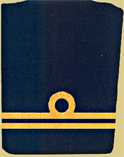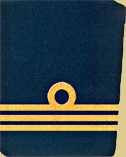Ranks in the Austro-Hungarian Navy
The rank insignia of the Austro-Hungarian Navy were worn on and on sleeves for navy jackets and coats, or on shoulder straps of shirts and white jackets. Officers' ranks were indicated by lines of 1.3 centimetres (0.51 in) gold braid as were senior non-commissioned officers' ranks, enlisted men's rank was indicated by white stars on their square collar flaps. Senior officers and flag officers would wear a broader gold braid line (Stabsoffiziers-Distinktionsborte or General-Distinktionsborte resp.) of 3.3 centimetres (1.3 in) and 5.3 centimetres (2.1 in) resp. beneath smaller lines, in addition flag officers would wear a crown on top of their sleeve insignia.
Rank system
For enlisted men an elaborate rank system existed distinguishing between Mannschaften (crew), Chargen (junior non-commissioned officers), Unteroffizieren (Maaten/NCOs) and Bootsleute/Feldwebel (senior NCOs). In addition the rank indicated the special training the men had received, indicated by a specialty badge worn on the left sleeve. The basic rank would be combined with the specialty resulting in numerous ratings. Non-commissioned officers would be seamen 1st class (one white star) or Gasten and Quartiermeister depending on specialty (two white stars) and Maate (three white stars). Bootsleute would wear the blue or white navy jacket with gold braid half stripes of 11 cm length on the sleeves or shoulder straps. They would be called Meister (master) sometimes Untermeister in the basic rank, the next senior rank would be 'preceded by 'Stabs- (staff), and then Oberstabs-.
Enlisted men and Chargen
Career and specialist insignia indicated on left sleeve.
 |
 |
 |
| Mannschaften | Chargen 1 star | Chargen 2 stars |
| k.u.k. Geschützvormeister 2. Klasse | k.u.k. Geschützvormeister 1. Klasse | k.u.k. Geschützgast |
| k.u.k. ...matrose 2. Klasse | k.u.k. ...matrose 1. Klasse | k.u.k. ...gast / ...quartiermeister |
|
|
|
| k.u.k. Heizer 2. Klasse | k.u.k. Heizer 1. Klasse | k.u.k. Oberheizer |
| k.u.k. Militärarbeiter 2. Klasse k.u.k. Minenvormann 2. Klasse k.u.k. Torpedovormann 2. Klasse |
k.u.k. Militärarbeiter 1. Klasse k.u.k. Minenvormann 1. Klasse k.u.k. Torpedovormann 1. Klasse |
k.u.k. Vorarbeiter ...
|
Maate on junior NCO level
 |  | .png) |
| Maate | Maate (on Bootsmann grade) | |
| k.u.k. Bootsmannsmaat | k.u.k. Unterbootsmann | |
| k.u.k. Geschützmaat | k.u.k. Untergeschützmeister | |
| k.u.k. ...maat | k.u.k. ... | |
|
| |
| k.u.k. Vorarbeiter 1.Klasse | k.u.k. Unterwerkmeister | |
Rank insignia senior NCOs
 |
.png) |
 |
.png) |
 |
 |
| Stabsunteroffiziere | |||||
|
k.u.k. Stabsbootsmann
|
k.u.k. Oberstabsbootsmann
|
Einjährig-Freiwilliger | Longer serving NCOs | ||
Commisioned Officers
Officers aspirants
Prospective officers would enter the naval academy and become Seekadett (officer cadets) and later Seefähnrich before being commissioned as Fregattenleutnants. Reserve officer candidates would join as Einjährig-Freiwillige (one-year volunteers). These sons of the higher classes who could afford the expenses would then get some training and be commissioned as Korvettenleutnant if successful. Einjährige would also wear the blue navy jacket but with two smaller gold braid stripes.
Officers
| sleeve |  |
.png) |
 |
 |
 |
 |
 | |
| designation | Fähnriche | Reserve officer | Oberoffiziere | Senior officers | ||||
| Seekadett | Seefähnrich | Korvettenleutnant | Fregattenleutnant | Linienschiffsleutnant | Korvettenkapitän | Fregattenkapitän | Linienschiffskapitän | |
| c | b | a | OF-2 | OF-3 | OF-4 | OF-5 | ||
|---|---|---|---|---|---|---|---|---|
| OF-1 | ||||||||
Flag officers
| sleeve command flag |
.png) |
.svg.png) |
 |
.svg.png) |
 |
.svg.png) |
 |
 |
| rank designation | Konteradmiral | Vizeadmiral | Admiral | Großadmiral | ||||
| (Hun: Ellentengernagy) | (Hun: Altengernagy) | (Hun: Tengernagy) | (Hun: Főtengernagy) | |||||
| OF-6 | OF-7 | OF-8 | OF-10 | |||||
|---|---|---|---|---|---|---|---|---|
References
Literature
- Stefan Rest: Des Kaisers Rock im Ersten Weltkrieg. Uniformierung und Ausrüstung der Österreichisch-Ungarischen Armee von 1914 bis 1918. Verlag Militaria, Wien 2002, ISBN 3-9501642-0-0.
- k.u.k. Kriegsministerium: Dislokation und Einteilung des k.u.k Heeres, der k.u.k. Kriegsmarine, der k.k. Landwehr und der k.u. Landwehr. In: Seidels kleines Armeeschema, Seidel & Sohn, Wien 1914.
- Mag. Stefan Fördö: Österreich-Ungarns Heeresuniformierung im 20. Jahrhundert in Beschreibung und Beispielen, Zadní dvůr-Press, Ústí nad Labem (CZ) 2008. (Loseblattsammlung)
- k.u.k. Kriegsministerium: Adjustierungsvorschrift für das k.u.k. Heer, die k.k. Landwehr, die k.u. Landwehr, die verbundenen Einrichtungen und das Korps der Militärbeamten, Wien 1911/1912.
- Organische Vorschrift für das Personal der k.u.k. Kriegsmarine: Adjustierung und Ausrüstung". Wien, 1907-12.